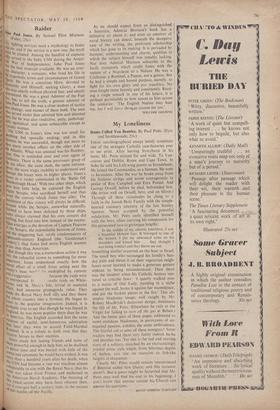My Loneliness
THESE autobiographical essays surely constitute one of the strangest Catholic case-histories ever to see print. After leaving Stonyhurst in his teens, Mr. Potts strayed far and wide. To Van- couver and Dublin, Rome and Cape Town. In Soho he sold his Left-wing poems as broadsheets. He joined the Commandos, as a batman. He went to Jerusalem. After the war he broke away from his Stalinist strings and wrote courageously in praise of Roy Campbell and Ezra Pound. And George Orwell, before he died, befriended him. (He writes well on Orwell, here, and on Silone.) Through all these vicissitudes he clung to a faith in the Jewish Holy Family with the simple- hearted visionary intensity of the late Stanley Spencer. Never accepted by the powerful solidarities, Mr. Potts early identified himself with the Jews, often carrying his compassion for this persecuted race to grotesque lengths: In the middle of my atlantic loneliness, I saw a beautiful Hebrew face. It belonged to one of the waiters. I put my unwanted arms on his shoulders and kissed him . . . they thought 1 was being ironical and they threw me out.
Something similar occurred on the boat to Israel. The small boy who scrounged his family's Sun- day joint and thrust it on their vegetarian neigh- bours never learned to make a generous gesture without its being misunderstood. Then there was the incident when his Catholic hostess ven- tured to criticise Jews: 'I quietly walked over to a statue of Our Lady, standing in a niche against the wall, broke it against her mantelpiece, and put the broken pieces in the fire.' This ob- sessive Madonna image, well caught by Mr. Robert MacBryde's dustcover design, dominates the life of Mr. Potts. (Elsewhere he rails at the Virgin for failing to turn off the gas at Belsen ) And the better part of these pages, addressed to more mundane Madonnas, in paroxysms of un- requited passion, exhibits the same ambivalence. The fearful odi et amo of these nosegays! Some readers may find them very funny indeed, ha-ha and peculiar too. Yet this is the sad and moving story of a solitary, matched by an excruciatingly painful prose style which, from hilarious depths of bathos, caa rise on occasion to Job-like heights of eloquence. Clearly Mr. Potts would remain 'unconvinced if Beatrice called him Dante; and this reviewer daren't. But a guess might be hazarded that Mr. Potts may well find his end in his beginning. I don't know that anyone outside his Church can answer his questions.
HUGH. (JORDON' PORTEUS•






































 Previous page
Previous page